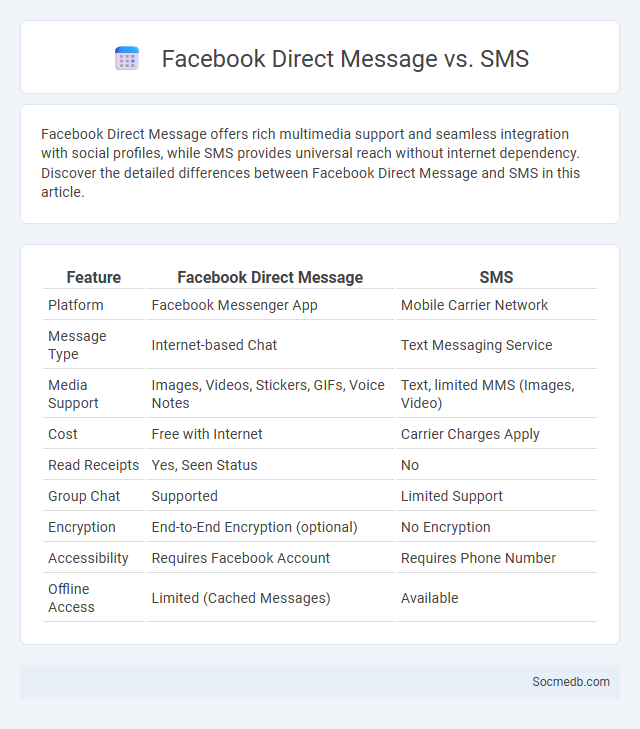
Photo illustration: Facebook Direct Message vs SMS
Facebook Direct Message offers rich multimedia support and seamless integration with social profiles, while SMS provides universal reach without internet dependency. Discover the detailed differences between Facebook Direct Message and SMS in this article.
Table of Comparison
| Feature | Facebook Direct Message | SMS |
|---|---|---|
| Platform | Facebook Messenger App | Mobile Carrier Network |
| Message Type | Internet-based Chat | Text Messaging Service |
| Media Support | Images, Videos, Stickers, GIFs, Voice Notes | Text, limited MMS (Images, Video) |
| Cost | Free with Internet | Carrier Charges Apply |
| Read Receipts | Yes, Seen Status | No |
| Group Chat | Supported | Limited Support |
| Encryption | End-to-End Encryption (optional) | No Encryption |
| Accessibility | Requires Facebook Account | Requires Phone Number |
| Offline Access | Limited (Cached Messages) | Available |
Introduction: Understanding Messaging Platforms
Messaging platforms are essential tools in modern social media ecosystems, enabling real-time communication through text, voice, and multimedia sharing. Popular platforms such as WhatsApp, Facebook Messenger, and Telegram facilitate seamless interaction among users worldwide, enhancing connectivity and engagement. These platforms support features like group chats, end-to-end encryption, and integration with other social media services, driving their widespread adoption.
What is Facebook Direct Message?
Facebook Direct Message is a private communication feature within the Facebook platform that allows users to send text, images, videos, and links directly to one or multiple recipients. This messaging service supports real-time conversations and includes options like read receipts, typing indicators, and multimedia sharing to enhance user interaction. Facebook Direct Message is accessible via both the Facebook website and the Messenger app, providing seamless connectivity across devices.
What is SMS?
SMS stands for Short Message Service, a text messaging service component of most telephone, internet, and mobile device systems. Your mobile phone uses SMS to send and receive short text messages that are limited to 160 characters per message. SMS plays a crucial role in social media by enabling instant communication and delivering notifications directly to your device.
What is Direct Message (DM)?
A Direct Message (DM) is a private communication tool on social media platforms that allows users to send messages directly to one another without posting publicly. DMs enable you to share text, images, videos, and links securely between individual users or groups. This feature enhances personalized interaction and ensures confidentiality within your social networking experience.
User Experience Comparison
User experience on social media platforms varies significantly based on interface design, content relevance, and engagement tools. Platforms like Instagram prioritize visual storytelling with intuitive navigation, while Twitter centers on real-time information flow, impacting how you interact and consume content. Personalized algorithms across these networks enhance user satisfaction by tailoring feeds to individual preferences, streamlining your social media experience.
Security and Privacy Differences
Social media platforms vary significantly in security and privacy features, with some offering end-to-end encryption and others relying on basic data protection measures. User control over personal data sharing differs widely, influencing exposure to risks such as identity theft and unauthorized data mining. Regulatory compliance and transparency in data handling also affect how securely user information is managed across different social networks.
Reach and Accessibility
Social media platforms offer unparalleled reach, enabling brands to connect with billions of users worldwide across diverse demographics and geographic locations. Enhanced accessibility features, such as voice commands, screen readers, and customizable interfaces, ensure content is inclusive and usable by people with disabilities. These elements combined maximize audience engagement and foster an inclusive online community essential for digital marketing success.
Cost and Limitations
Social media platforms offer cost-effective marketing opportunities, often requiring minimal investment compared to traditional advertising channels. However, You must consider limitations such as algorithm changes that reduce organic reach, potential negative feedback from users, and data privacy concerns that may impact campaign performance. Budget constraints can also affect the ability to sustain long-term engagement and targeted ad spend optimization.
Best Use Cases for Each Platform
Instagram excels in visual storytelling, making it ideal for brands in fashion, food, and travel to share engaging photo and video content that boosts brand awareness and customer engagement. LinkedIn is the premier platform for B2B marketing, professional networking, and thought leadership, offering robust tools for sharing industry insights, job postings, and company updates. Twitter is best suited for real-time communication, customer service, and trending topic discussions, enabling businesses to connect directly with audiences through concise messages and hashtags.
Conclusion: Choosing the Right Messaging Channel
Selecting the optimal messaging channel depends on factors such as target audience demographics, message urgency, and content type. Platforms like WhatsApp and Facebook Messenger excel in personal, real-time communication, while email suits detailed, formal messages. Aligning the messaging channel with communication goals enhances user engagement and campaign effectiveness.
 socmedb.com
socmedb.com